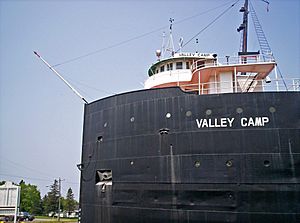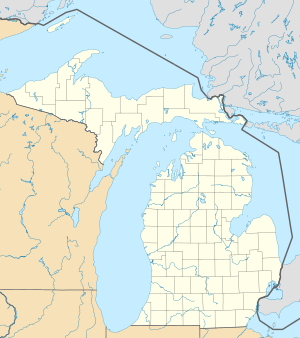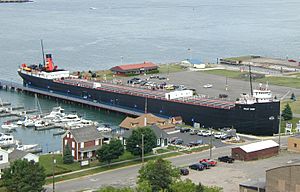SS Valley Camp facts for kids
 |
|
Quick facts for kids History |
|
|---|---|
| Name |
|
| Owner |
|
| Builder | American Shipbuilding Co. |
| Launched | 1917 |
| In service | 1917-1966 |
| Status | Museum ship |
| General characteristics | |
| Tonnage | 12,000 GRT |
| Length | 550 ft (170 m) |
| Beam | 58 ft (18 m) |
| Depth of hold | 31 ft (9.4 m) |
| Installed power | 1,800 hp (1,300 kW) triple expansion steam engine |
|
SS Valley Camp
|
|
| Location | Sault Ste. Marie, Michigan |
| Built | 1917 |
| Architect | American Shipbuilding Co. |
| NRHP reference No. | 72000606 |
| Significant dates | |
| Added to NRHP | 1 February 1972 |
The SS Valley Camp is a large lake freighter that sailed on the Great Lakes for almost 50 years. Today, it is a museum ship in Sault Ste. Marie, Michigan, where visitors can explore its history.
Contents
The Valley Camp's Journey
The Valley Camp started its life in Lorain, Ohio, in 1917. It was first named the Louis W. Hill. For 38 years, it worked for the National Steel Corporation, carrying heavy loads of iron ore and coal. These materials were very important for making steel.
New Owners and a New Name
In 1955, the ship was sold to the Wilson Marine Transit Company. This is when it got its current name, Valley Camp. With its new owner, the ship began carrying a wider range of "bulk goods," which means large amounts of things like grains and stone.
The Valley Camp stayed with the Wilson Fleet until 1959. Then, the Republic Steel Corporation bought it and several other ships. One of these was its identical sister ship, the Silver Bay. The Valley Camp kept its name and continued to haul iron ore and coal. It delivered these goods to steel mills in cities like Buffalo, New York, Cleveland, Ohio, and Indiana Harbor, Indiana.
Retirement and Museum Life
The Valley Camp made its final voyage in 1966. It was taken out of service because its coal-burning boilers had problems. Its sister ship, the Silver Bay, continued sailing until the early 1980s.
In 1968, Le Sault de Sainte Marie Historical Sites, Inc., bought the ship for $10,000. On July 6, 1968, the Valley Camp was towed from Wisconsin to Sault Ste. Marie. This happened during the city's 300th-anniversary celebration.
Today, the Valley Camp is a special museum ship. It is even listed on the National Register of Historic Places. Visitors can walk through the ship and see many exhibits in its huge cargo hold. These exhibits include hundreds of artifacts, paintings, and models. You can also see two lifeboats from the famous shipwreck of the SS Edmund Fitzgerald.
Exploring the Ship
The Valley Camp is a very long ship, stretching about 550 feet (167 meters) from end to end. Its main body, called the keel, is 525 feet (160 meters) long. The ship is 58 feet (17 meters) wide and 31 feet (9 meters) deep. It could carry a massive 12,000 gross tons of cargo.
Power and Design
The ship was powered by an 1800-horsepower "triple expansion reciprocating steam engine." This type of engine uses steam to push pistons, making the ship move. The Valley Camp still has this original engine today.
The ship was never the most important ship in its fleet. Its living areas for the crew were simple but comfortable. The crew's quarters have wood trim and basic bunk beds. The "wheelhouse," where the ship was steered, also has wood lining and shiny brass details. The ship's original steering wheel is still there.
Unique Features
At the back of the ship, its original smokestack is still in place. This includes its "double-chime whistle," which made a loud, unique sound. The Valley Camp is special because it is almost exactly as it was when it sailed. It is one of the best examples of the classic Great Lakes ore carriers. Many hundreds of these ships once sailed, but very few remain today.
Images for kids





